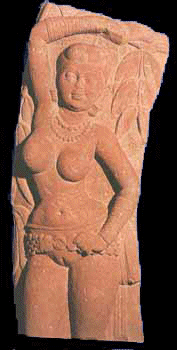|
|
|
Queen of Heaven and of Earth:
The Descent of Inanna
By STONE

|
"In the first days, In the first nights, In the first years, When everything needed was brought into being...
At that time, a tree, a single tree, a hluppu tree
A young woman walking by the banks of the river
The young woman, Inanna, planted the tree.
'How long will it be until I have a shining throne How long will it be until I have a shining bed
|
|
"He shaped her loins with his soft hands, The shepherd Dumuzi filled her lap with cream and milk, He stroked her pubic hair, He watered her womb.
With his hands he held her full vulva,
Then she caressed the high priest on the bed,
Inanna, The First Daughter of the Moon, |
|
"Inanna, the Queen of Heaven, decreed the fate of Dumuzi: 'In battle, I your leader In combat, I as your armor-bearer In the assembly, I am your advocate On the campaign, I am your Inspiration. In all ways you are fit: To sit on your throne To wear the crown on your head To race on the road with the holy scepter To wear the holy sandals on your font To prance on the holy breast like a lapis calf." |
|
'When Ereshkigal, the Queen of the Underworld, heard this, she slapped her thigh and bit her lip. She took the matter into her heart and dwelt on it. The she spoke: |
|
"Inanna was turned into a corpse, A piece of rotting meat. And was hung from a hook on the wall...
After three days and three nights when Inanna did not
'O Father Enlil, do not let your bright silver Do not let the Holy Priestess of Heaven be put to death
|
|
"Dumuzi reaches out his hand for food and drink. The palace is festive. The king is joyous. Dumuzi halls Inanna with the praises of the gods Inanna looks in sweet wonder from heaven.
The people of Sumer parade before the holy Inanna. Mighty, majestic, radiant, and ever youthful-- To you, Inanna, I sing." |
